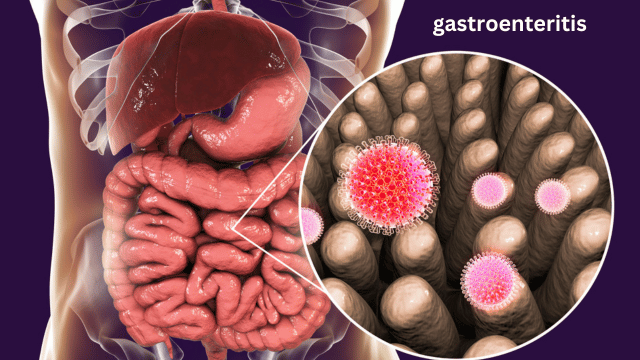Stomach and intestinal inflammation is known as gastroenteritis, or the “stomach flu.” Numerous unpleasant symptoms may result from it, frequently interfering with day-to-day activities. It can be managed and its effects lessened by being aware of the main symptoms of gastroenteritis as well as its causes and available treatments.
Understanding Gastroenteritis
Infections from bacteria, parasites, or viruses are the cause of gastroenteritis. It is transmitted via tainted food or drink, intimate contact with an infected individual, and inadequate hygiene habits. Although gastroenteritis may affect anybody, it is more prevalent in young children, the elderly, and those with weakened immune systems.
Common Symptoms of Gastroenteritis
Infections from bacteria, parasites, or viruses are the cause of gastroenteritis. It spreads by tainted food or water. The diarrhea
Frequent, loose, watery stools are a typical symptom of diarrhea, which is one of the most prevalent signs of gastroenteritis. It is important to drink enough of water to keep hydrated because this symptom might cause dehydration.
Feeling queasy and throwing up
Vomiting and nausea are common side effects of gastroenteritis, which can cause serious pain and fluid loss. Dehydration may be avoided and these symptoms can be managed by consuming modest amounts of clear water.
Pain in the abdomen and cramps
Abdominal discomfort and cramps are common and can range in severity, usually centered in the stomach region. Painkillers available over-the-counter could be able to ease some of this agony.
Fever
When gastroenteritis is present, a low-grade fever is typical; however, if the illness is bacterial, the fever may occasionally be greater. It’s critical to keep an eye on your fever and treat it with the right medicines and fluids.
Diminished Hunger
It is typical to have a reduction in appetite, which can lead to nutritional deficits and weakness. Eating bland, light meals like rice, bread, and crackers might be easy on the stomach.
Causes of Gastroenteritis
infections caused by viruses
The most common causes of gastroenteritis are viruses, including rotavirus and norovirus. In populated areas like elderly homes and schools, these diseases are easily transmissible.
Bacterial Diseases
Gastroenteritis can be brought on by bacteria including Salmonella, Campylobacter, and Escherichia coli (E. coli). A common cause of these diseases is drinking or eating tainted food.
Parasitic Diseases
Gastroenteritis can be brought on by parasites like Giardia and Cryptosporidium, which are typically obtained from polluted water sources.
Diagnosis and Treatment
Identification
Based on a physical examination and a study of symptoms, a medical professional can make the diagnosis of gastroenteritis. Stool tests are occasionally performed to pinpoint the precise source of the illness.
Handling
The mainstay of therapy for gastroenteritis is hydration. Oral rehydration solutions (ORS) are a useful tool for replacing electrolytes and fluids lost as a result of vomiting and diarrhea. Medication for nausea and diarrhea prevention and treatment can help manage symptoms. Antibiotics are ineffective against viruses, however they may be recommended for bacterial infections. To aid in the body’s recovery and ability to fight off the illness, getting enough sleep is crucial.
Preventive Measures
Adequate Sanitation
The best defense against gastroenteritis is frequent hand washing with soap and water. When soap and water are not accessible, hand sanitizers come in handy as well.
wholesome eating habits
Bacterial gastroenteritis can be considerably decreased by fully cooking food and preventing cross-contamination. Prior to eating, wash fruits and vegetables.
Pure Water
Parasitic diseases can be avoided by avoiding possibly contaminated sources and drinking clean, filtered water.
Immunization
There are vaccines available for some kinds of gastroenteritis, such rotavirus. It’s crucial to speak with a healthcare professional regarding immunizations, particularly for young patients.
Conclusion
Understanding the primary symptoms of gastroenteritis is essential for timely and efficient treatment. People may take the appropriate action to reduce suffering and stop the spread of this common gastrointestinal ailment by being aware of the symptoms, causes, and available treatments. Reducing the risk of gastroenteritis and assuring a speedier recovery need practicing excellent hygiene and implementing preventative measures.












